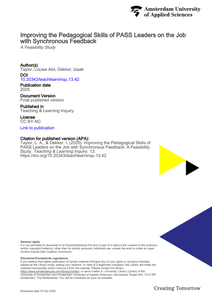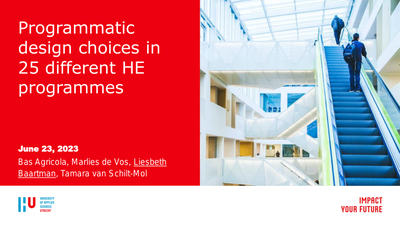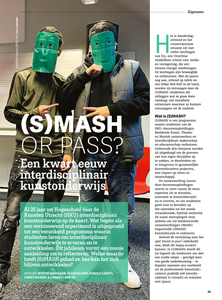Peer assisted study sessions (PASS), also known as Supplemental instruction, are structured peer guided sessions linked to a specific course, led by experienced and trained students called PASS-leaders. These PASS-leaders undergo several days of training before running their first session and receive supervision and feedback ‘on the job’. Research suggests that training improves student outcomes whereby supervision is considered best practice, as required by PASS protocols. However, it is unclear what type of supervision best supports PASS-leaders. Thus far, studies have not compared different methods for on-the-job interventions. Current practice involves supervisors observing PASS sessions without intervening but providing post hoc feedback. While this prevents undermining the PASS leaders, it delays their ability to act on feedback immediately. This study, carried out at an institution for initial teacher education, developed and tested a method for providing immediate feedback using a bug-in-ear device linked to a live-stream. Six PASS-leaders were observed during 4-6 sessions each, receiving either synchronous feedback with a bug-in-ear or in-person asynchronous post hoc feedback. In group interviews PASS-leaders reported appreciating the immediacy of synchronous feedback which allowed them to act on it in real-time. The surveys after each lesson indicated that they felt significantly more confident about teaching following live feedback. They described the supervisor as an invisible helper, providing support or assistance. Because the bug-in-ear method could only provide feedback on visible instructional and pedagogical actions, both PASS-leaders and PASS-supervisors recommended using this as a supplement to a pre-session briefing and a post-session debrief.
DOCUMENT

Assessment in higher education (HE) is often focused on concluding modules with one or more tests that students need to pass. As a result, both students and teachers are primarily concerned with the summative function of assessment: information from tests is used to make pass/fail decisions about students. In recent years, increasing attention has been paid to the formative function of assessment and focus has shifted towards how assessment can stimulate learning. However, this also leads to a search for balance between both functions of assessment. Programmatic assessment (PA) is an assessment concept in which their intertwining is embraced to strike a new balance. A growing number of higher education programmes has implemented PA. Although there is consensus about the theoretical principles that form the basis for the design of PA, programmes make various specific design choices based on these principles, fitting with their own context. This paper provides insight into the design choices that programmes make when implementing PA and into the considerations that play a role in making these design choices. Such an overview is important for research purposes because it creates a framework for investigating the effects of different design choices within PA.
DOCUMENT

Assessment in higher education (HE) is often focused on concluding modules with one or more tests that students need to pass. As a result, both students and teachers are primarily concerned with the summative function of assessment: information from tests is used to make pass/fail decisions about students. In recent years, increasing attention has been paid to the formative function of assessment and focus has shifted towards how assessment can stimulate learning. However, this also leads to a search for balance between both functions of assessment. Programmatic assessment (PA) is an assessment concept in which their intertwining is embraced to strike a new balance. A growing number of higher education programmes has implemented PA. Although there is consensus about the theoretical principles that form the basis for the design of PA, programmes make various specific design choices based on these principles, fitting with their own context. This paper provides insight into the design choices that programmes make when implementing PA and into the considerations that play a role in making these design choices. Such an overview is important for research purposes because it creates a framework for investigating the effects of different design choices within PA.
DOCUMENT

Supplemental instruction, also known as Peer Assisted Study Sessions (SI-PASS), is a well-established form of peer learning that has been implemented in higher education institutions across the globe and that coincides with learning gains for participants. While the effects on learning gains have been extensively studied with quasi-experiments, the underlying mechanisms that make SI-PASS effective are less well understood. This study explored what benefits students thought SI-PASS offered and through which mechanisms. We studied this by interviewing 14 students who participated in SI-PASS during a field experiment that reliably found a significant impact of SI-PASS on performance. The students were asked to expand on if and why they thought SI-PASS was effective. Thematic analysis and independent coding indicated an interplay of three main drivers. SI-PASS was experienced as effective because it stimulated the use of effective study techniques and social learning. These drivers were facilitated and enhanced by a pedagogical climate that lowered the threshold to engage in collaborative learning and effective study techniques. These findings could help pinpoint what elements should be highlighted during the preparation of SI-leaders and what aspects should be monitored and tested when implementing or studying SI-PASS.
DOCUMENT

Al 25 jaar zet HKU interdisciplinair kunstonderwijs op de kaart. Wat begon als een vernieuwend experiment is uitgegroeid tot een verankerd programma waarin studenten leren om interdisciplinair kunstonderwijs te ervaren en te ontwikkelen. Dit jubileum vormt een mooie aanleiding om te reflecteren: Welke waarde heeft (S)MASH gehad en hoe kan het zich blijven ontwikkelen?
DOCUMENT

Biodiversity preservation is often viewed in utilitarian terms that render non-human species as ecosystem services or natural resources. The economic capture approach may be inadequate in addressing biodiversity loss because extinction of some species could conceivably come to pass without jeopardizing the survival of the humans. People might be materially sustained by a technological biora made to yield services and products required for human life. The failure to address biodiversity loss calls for an exploration of alternative paradigms. It is proposed that the failure to address biodiversity loss stems from the fact that ecocentric value holders are politically marginalized and underrepresented in the most powerful strata of society. While anthropocentric concerns with environment and private expressions of biophilia are acceptable in the wider society, the more pronounced publicly expressed deep ecology position is discouraged. “Radical environmentalists” are among the least understood of all contemporary opposition movements, not only in tactical terms, but also ethically. The article argues in favor of the inclusion of deep ecology perspective as an alternative to the current anthropocentric paradigm. https://doi.org/10.1080/1943815X.2012.742914 https://www.linkedin.com/in/helenkopnina/
DOCUMENT

Background: Development of more effective interventions for nonspecific chronic low back pain (LBP), requires a robust theoretical framework regarding mechanisms underlying the persistence of LBP. Altered movement patterns, possibly driven by pain-related cognitions, are assumed to drive pain persistence, but cogent evidence is missing. Aim: To assess variability and stability of lumbar movement patterns, during repetitive seated reaching, in people with and without LBP, and to investigate whether these movement characteristics are associated with painrelated cognitions. Methods: 60 participants were recruited, matched by age and sex (30 back-healthy and 30 with LBP). Mean age was 32.1 years (SD13.4). Mean Oswestry Disability Index-score in LBP-group was 15.7 (SD12.7). Pain-related cognitions were assessed by the ‘Pain Catastrophizing Scale’ (PCS), ‘Pain Anxiety Symptoms Scale’ (PASS) and the task-specific ‘Expected Back Strain’ scale(EBS). Participants performed a seated repetitive reaching movement (45 times), at self-selected speed. Lumbar movement patterns were assessed by an optical motion capture system recording positions of cluster markers, located on the spinous processes of S1 and T8. Movement patterns were characterized by the spatial variability (meanSD) of the lumbar Euler angles: flexion-extension, lateralbending, axial-rotation, temporal variability (CyclSD) and local dynamic stability (LDE). Differences in movement patterns, between people with and without LBP and with high and low levels of pain-related cognitions, were assessed with factorial MANOVA. Results: We found no main effect of LBP on variability and stability, but there was a significant interaction effect of group and EBS. In the LBP-group, participants with high levels of EBS, showed increased MeanSDlateral-bending (p = 0.004, η2 = 0.14), indicating a large effect. MeanSDaxial-rotation approached significance (p = 0.06). Significance: In people with LBP, spatial variability was predicted by the task-specific EBS, but not by the general measures of pain-related cognitions. These results suggest that a high level of EBS is a driver of increased spatial variability, in participants with LBP.
DOCUMENT

This article starts from the observation that popular culture resides in a contradictory space. On the one hand it seems to be thriving, in that the range of media objects that were previously studied under the rubric of popular culture has certainly expanded. Yet, cultural studies scholars rarely study these media objects as popular culture. Instead, concerns about immaterial labor, about the manipulation of voting behavior and public opinion, about filter bubbles and societal polarization, and about populist authoritarianism, determine the dominant frames with which the contemporary media environment is approached. This article aims to trace how this change has come to pass over the last 50 years. It argues that changes in the media environment are important, but also that cultural studies as an institutionalizing interdisciplinary project has changed. It identifies “the moment of popular culture” as a relatively short-lived but epoch-defining moment in cultural studies. This moment was subsequently displaced by a set of related yet different theoretical problematics that gradually moved the study of popular culture away from the popular. These displacements are: the hollowing out of the notion of the popular, as signaled early on by Meaghan Morris’ article “The Banality of Cultural Studies” in 1988; the institutionalization of cultural studies; the rise of the governmentality approach and a growing engagement with affect theory.
LINK
Naar aanleiding van de artikelen Basketbal: ‘aanvallen in motion’ in de bovenbouw in de lichamelijke opvoeding van februari 2011 en deel 2 in februari 2012 werd het tijd om de veronderstellingen aan praktijkgericht onderzoek te onderwerpen. Met als doel om inzicht te krijgen hoe het basketbalspel gedifferentieerd kan worden voor de zwakke en goede spelers, zodat er een eerlijke spanning blijft tussen alle spelers. Dit artikel gaat over onderzoek naar samenspelen bij basketbal door de voorspelbaarheid van loopacties (teamafspraken) te vergroten bij gemengde teams (jongens en meisjes samen in een team).
DOCUMENT

Populists deny the problems we face ecologically and pass them on to the next generations. In this article I discuss 4 populist statements 1. The Netherlands for the Dutch, 2. The “ordinary” Dutch person is entitled to his/her prosperity, 3. The Netherlands is full, no more asylum seekers and 4. Our national level of education is superior - I will contradict it here, light of the numbers. I conclude that the figures and statistics show that these claims cannot hold up at all with the available evidence.
MULTIFILE
